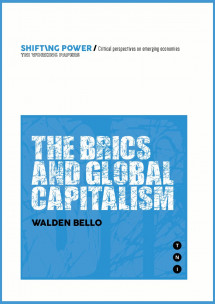Ideas into movement
Boost TNI's work
50 years. Hundreds of social struggles. Countless ideas turned into movement.
Support us as we celebrate our 50th anniversary in 2024.

The rapid growth of BRICS economies can not obscure a growing crisis of inequality, social unrest and the perils and limits of export-orientated economies.

Does the emergence of a multipolar global order open up policy space for alternative economic visions and pose a necessary challenge to a US and Northern-dominated global order? Or might it instead reinvigorate capitalism and exploitation by a new constellation of corporate elites? How should social movements respond in a way that embraces needed changes to the post-colonial status quo yet supports communities struggles against the impacts of land grabbing, environmental destruction and rising inequality, this time perpetuated by emerging economy governments?
Transnational Institute’s (TNI) Shifting Power Working Paper Series seeks to help movements navigate our changing multipolar world as well as provide an invaluable source of alternative analysis for students, analysts and journalists.
The Brics and Global Capitalism
Perhaps the key arena where “BRIC consciousness” was forged was in the World Trade Organization. Barely had the WTO been established in 1995, than the United States and the Europe Union wanted more trade concessions from the developing countries. India and Brazil emerged as the key actors in a defensive strategy that resulted in the formation of the Group of 20. This formation emerged as the most formidable opposition to the unequal trade liberalisation that the North was foisting on the South, and was instrumental in bringing about the collapse of the Fifth Ministerial Meeting of the WTO in Cancun in September 2003. The Group, led by Brazil, India, and South Africa and fortified with the accession of China, played the key role not only in halting the Euro-American drive for greater liberalisation in the agriculture, manufacturing, and services sectors of developing countries, but in stopping the North’s effort to expand the WTO’s authority into the areas of investment, competition policy, government procurement, and trade facilitation.
The agendas of the BRICS in the WTO were not always the same. For instance, in agriculture, Brazil was more interested in opening up export markets for its soybeans and other plantation products in Europe
and the United States, while India put the emphasis on protecting its small-peasant agriculture. But they were willing to subordinate their differences to a common comprehensive anti-liberalisation and pro-development agenda that helped bring the Doha Round of negotiations to a standstill.
The coordination achieved in the WTO was translated into cooperation in the other Group of 20, the group of governments that came together in response to the eruption of the global financial crisis in 2008, and in the global climate negotiations, where China and India essentially set the agenda for the Group of 77 and China.